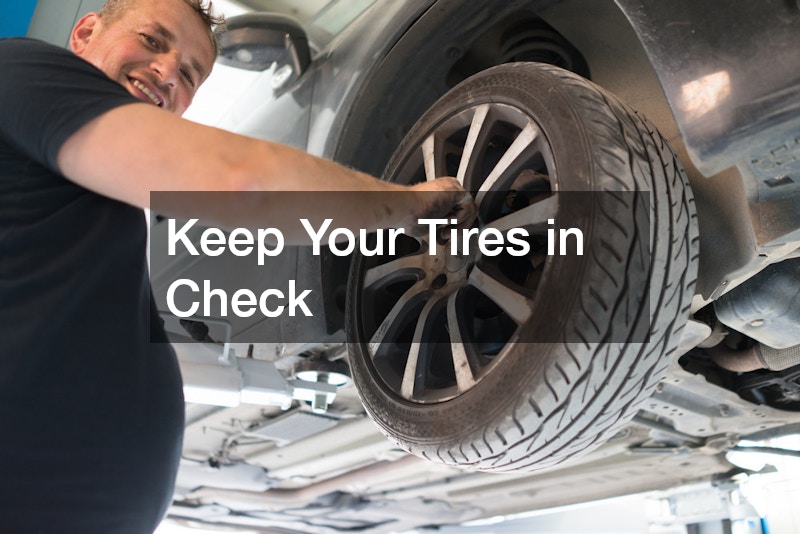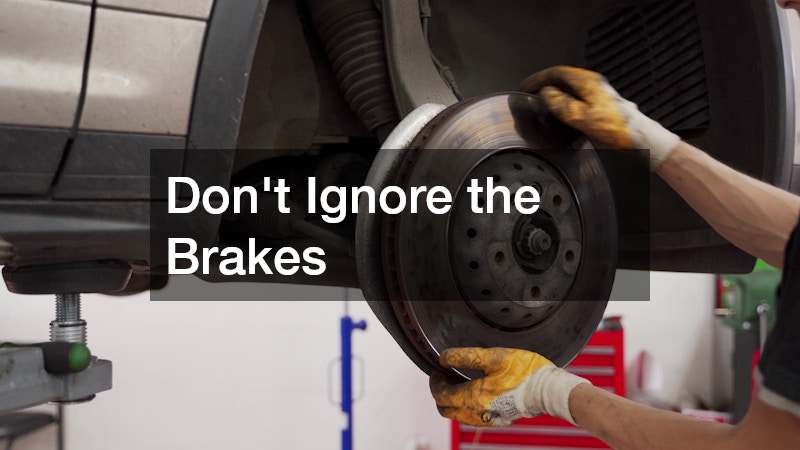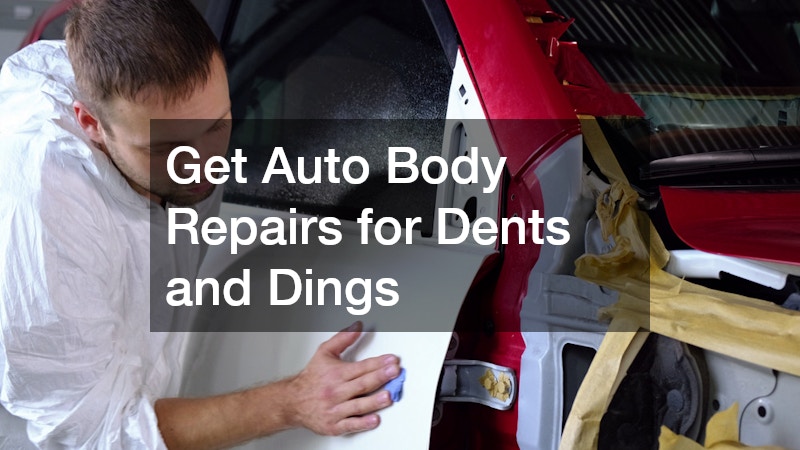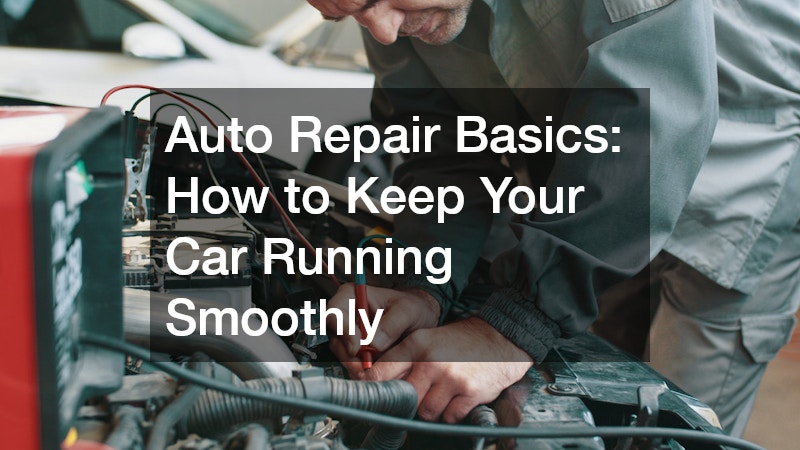Maintaining your vehicle is one of the smartest financial decisions you can make. Regular maintenance and timely repairs not only extend your car’s lifespan but also improve safety and fuel efficiency. Whether you’re commuting to work or heading out on a road trip, knowing the basics of auto repair can save you time, money, and frustration. This guide will walk you through the fundamentals—from everyday care to handling unexpected breakdowns—so you can keep your car running like new.
Start with Routine Maintenance
Think of car maintenance like health care: the better your preventive care, the less likely you’ll face expensive emergencies. is essential in keeping your vehicle in top condition. Here are the basics every car owner should know to ensure their vehicles always run smoothly.
Oil Changes
Regular oil changes are crucial. Oil lubricates the engine, reduces wear and tear, and helps prevent overheating. Most vehicles need an oil change every 3,000 to 7,500 miles, depending on driving habits and oil type.
Skipping oil changes can lead to significant engine problems, so it’s important to adhere to a consistent schedule. Additionally, using high-quality oil can further protect and enhance your vehicle’s performance. Consult your owner’s manual or a professional if you’re unsure about the oil type your car requires.
Keeping detailed records of your oil changes will not only assist in maintenance tracking but also improve the resale value of your car. Regular oil maintenance is a that shouldn’t be overlooked if you aim to save on expensive car engine repair bills down the road.
Fluid Levels
In addition to motor oil, your car depends on several other fluids including coolant, brake fluid, transmission fluid, and windshield washer fluid. Regularly checking and maintaining these fluids is a basic that can prevent major vehicle issues.
If any of these fluids run low, it could result in damage that may require significant such as brake repairs or car engine repair. Keeping fluids at optimal levels ensures your vehicle operates smoothly and efficiently.
To maintain fluid levels, you can either do it yourself using your vehicle’s manual as a guide or visit a trusted professional. Ignoring a dip in fluid levels might lead to more frequent visits to your local towing company, and no one wants that.
Filter Replacements
Air and fuel filters help your engine breathe clean air and operate efficiently. Dirty filters can hurt performance and gas mileage. Replace air filters every 15,000 to 30,000 miles to ensure your engine’s peak performance.
Regularly replacing filters is a preventative measure that saves on costly repairs down the line. It’s a fundamental aspect of , contributing significantly to your car’s sustained efficiency and health.
Check your vehicle’s manual to identify the recommended maintenance schedule for filter changes. Regular filter replacement not only supports your car’s performance but also helps maintain cleaner air in the cabin. Delaying filter changes can lead to expensive car engine repair.
Keep Your Tires in Check

Tires are your vehicle’s only contact with the road, so keeping them in excellent condition is essential for safety and performance. includes regular tire maintenance to prevent accidents and prolong tire life.
Tire Pressure and Rotation
Check tire pressure monthly and before long trips. Under-inflated tires can decrease fuel efficiency and wear out faster, emphasizing the importance of conducting regular checks. Tire rotation every 5,000 to 7,000 miles ensures even tread wear.
Maintaining proper tire pressure significantly contributes to fuel efficiency and road safety. Regularly rotating your tires is a key element of that helps in maximizing tire life and preventing unnecessary damage.
Using a reliable tire gauge to check pressure enhances the accuracy of your measurements. Consistent tire care saves on tire repair costs and avoids unexpected breakdowns, possibly requiring the service of a local towing company.
Tire Repair
Punctures, sidewall damage, and tread separation can happen unexpectedly. If you notice a slow leak or warning light, visit a tire repair shop promptly. Addressing tire issues swiftly prevents more serious complications.
Ignoring signs of tire trouble can lead to dangerous conditions like blowouts. Regular tire inspections are part of comprehensive and crucial for road safety.
A certified local tire repair shop ensures your tires are properly assessed and repaired. Ensuring your tires are always in top condition is a proactive measure that protects both your safety and your wallet.
Don’t Ignore the Brakes

Your car’s brakes are arguably the most critical safety component. Regular inspection and brake repairs are necessary to avoid dangerous driving conditions. Always incorporate brake maintenance into your routine.
Signs You Need Brake Repairs
If you hear squealing or grinding noises, feel a spongy brake pedal, or notice the vehicle pulling to one side, these are signs it’s time for brake repairs. Ignoring these can lead to brake failure.
Routine brake inspections prevent more severe issues and give you peace of mind. Addressing brake problems early on ensures your efforts are efficient and effective.
Visiting a professional for regular brake evaluations can deter high costs and hazardous driving conditions. The emphasizes recognizing and solving brake issues promptly to ensure continuous vehicle safety.
Common Signs You Need Car Engine Repair
The engine is the heart of your vehicle, and paying attention to issues is crucial. Common indicators of needed car engine repair include the check engine light staying on, poor acceleration, and knocking or tapping noises.
Prompt attention to engine warnings can avert significant repairs. This is a core aspect of comprehensive to avoid catastrophic vehicle failure.
Regularly visiting a professional for engine diagnostics ensures any potential problems are identified early. Effective protects your investment and promotes a smoothly running vehicle.
Understand the Importance of Wheel Alignment
Proper wheel alignment ensures that your tires meet the road at the right angle, your wheels point in the correct direction, and your tires are centered in the wheel wells. It plays a crucial role in vehicle comfort and efficiency, making it an essential part of overall .
Why Wheel Alignment Matters
Misalignment can cause uneven tire wear, poor handling, and decreased fuel efficiency. Checking alignment once a year or after hitting a major pothole or curb is highly recommended.
Ensuring proper wheel alignment enhances vehicle handling and extends tire life, both vital elements of comprehensive . When misalignment goes unaddressed, it can lead to costly repair needs.
Engaging a professional for wheel alignment guarantees precision and accuracy. Regular alignment checks serve as both a preventative measure and a cost-saving tactic, aligned with objectives.
Take Care of Windows and Windshields

Cracked or damaged glass can impair your vision and compromise vehicle safety. Whether it’s a rock chip or storm damage, don’t put off glass repairs. Prioritize car window repair as a key component of consistent .
Car Window Repair and Local Auto Glass Repair
Small cracks in your windshield or side windows can often be fixed quickly and inexpensively. Prompt car window repair reduces the risk of the damage spreading.
Finding a local auto glass repair shop with solid reviews and certified technicians ensures safe, high-quality service. Skilled in auto glass care prolongs the life of your windows and windshields.
Routine inspections help identify areas needing attention before they worsen. Quick response to glass damage is a proactive part of your strategy.
Know What to Do After an Accident
Even minor collisions can result in hidden damage. Knowing what to do immediately after an auto accident is key to protecting both your physical safety and financial well-being, ingrained in the principle of comprehensive strategy.
Call a Local Towing Company
If your car isn’t driveable, contact a local towing company. Avoid driving if there are fluid leaks, broken lights, or wheel damage, upholding your commitment to safety and .
Relying on professional towing services ensures your vehicle is transported safely to a repair shop. This is a critical aspect of handling post-accident situations effectively.
Towing services offer peace of mind in critical situations, reducing further potential damage or stress. Always have a local towing company contact this handy to enhance your preparedness.
Get Auto Body Repairs for Dents and Dings

Cosmetic damage not only hurts your vehicle’s appearance but may also impact resale value. Don’t ignore dents, scratches, or paint damage as they are part of a robust strategy.
Auto Body Repairs to Restore Your Vehicle
Whether it’s minor damage from a shopping cart or major collision repairs, professional auto body repairs restore your car’s structure and aesthetics. Prioritize to maintain a vehicle that looks and performs optimally.
By entrusting your car to skilled technicians, you ensure that all cosmetic issues are addressed effectively. This component also helps retain your vehicle’s value over time.
Regular auto body assessments prevent minor imperfections from developing into significant issues. Investing in quality repairs reflects a holistic approach to your vehicle’s maintenance and efforts.
Choose the Right Auto Repair Shop
Not all repair shops are created equal. Finding a reliable and trustworthy shop can make all the difference in your vehicle’s longevity and your peace of mind. Follow in selecting the perfect service provider.
What to Look For:
Certifications: Look for shops certified by the ASE (Automotive Service Excellence) or AAA-approved facilities. These accreditations ensure compliance in all services conducted.
Experience: Choose mechanics with experience in the specific make and model of your vehicle. This specialization is crucial for effective , ensuring accurate diagnostics and repairs.
Transparency: A good shop will offer written estimates and explain repairs clearly. This transparency aligns with best practices for , building trust and rapport between you and the service provider.
Save Money with Preventive Maintenance
Many costly repairs are avoidable with simple, inexpensive maintenance. Here’s how to keep your repair bills low through consistent and diligent practices.
Preventive Tips:
Change oil on time: Adhering to a consistent oil change schedule is pivotal for vehicle health and . It avoids wear and extends engine life.
Check belts and hoses for wear: Regular inspection of these components prevents unexpected breakdowns, an integral element of practical application.
Replace worn wiper blades: Ensuring a clear field of vision is both essential for safety and constitutes a straightforward aspect of . Regular replacements are inexpensive, saving you from future headaches.
Create a Vehicle Maintenance Schedule
Every car is different, so refer to your owner’s manual for specific service intervals. Use a calendar or app to track when services are due. Sticking to a schedule prevents breakdowns, showcasing a proactive approach.
Common Intervals:
Every 5,000–7,500 miles: Oil change, tire rotation, brake inspection, all are essential components for keeping your vehicle running efficiently.
Every 15,000–30,000 miles: Air filter, fuel filter, coolant replacements support your car’s performance and are core to maintaining an efficient plan.
Every 60,000–100,000 miles: Timing belt, transmission fluid, spark plugs are major service intervals within that prevent larger, more costly issues.
Prepare for Emergencies
Even with the best maintenance, breakdowns can still happen. Be ready with a vehicle emergency kit that includes essential tools and contacts, reinforcing your readiness.
Emergency Kit Essentials:
Including item like jumper cables in your emergency kit ensures preparedness for unexpected situations, maintaining consistency in your strategy. Jumper cables are a must-have.
A flashlight and first-aid kit are basic components that support emergency preparedness. These items should always be available as part of your comprehensive plan.
A basic tool set, tire inflator, and sealant further ensure you’re equipped for minor roadside emergencies. Include these to fortify your approach in practical, real-world scenarios.
When to DIY and When to Call a Pro
While you can handle some minor repairs yourself, others require professional skill and equipment. Recognizing when to seek professional help is key in a balanced approach.
DIY-Friendly Tasks:
Changing windshield wipers is a simple, cost-effective task suitable for DIY that contributes to a diligent effort, ensuring safety and visibility.
Replacing air filters can easily be done at home. This is a manageable task that reinforces the basics of dependable management.
Regularly checking tire pressure is a straightforward task. Keeping tire pressures optimal is a prime example of effective implementation at the individual level.
Professional-Only Repairs:
Car engine repair: Complex and requiring specific expertise, this task is best left to the professionals for safe and accurate fulfillment.
Brake repairs: Given their critical safety role, brake repairs should be trusted to certified technicians as part of proper practice.
Wheel alignment: Precise adjustments made by experts protect tire integrity and vehicle handling, forming a critical element of structured management.
How to Handle Insurance Claims Smoothly
Dealing with insurance after an accident or repair doesn’t have to be stressful. Follow these tips to integrate insurance handling into your overall strategy efficiently—and ensure your rights and interests are protected at every step.
Insurance Tips:
-
Document Everything: Take photos of the damage, record conversations, and keep all receipts. These actions align closely with effective claim management by ensuring comprehensive documentation that can support your case if disputes arise.
-
Communicate Clearly: Contact Geico auto insurance agents or your respective insurer to file claims promptly. A proactive and transparent approach helps avoid delays and ensures a seamless insurance interaction.
-
Use Preferred Repair Shops: Many insurers work with certified shops to streamline the claims process. Choosing one of these providers can guarantee efficient practices and high-quality repairs covered under your policy.
-
Consult an Auto Accident Attorney if Needed: If your claim involves injury, disputed liability, or significant vehicle damage, speaking with an auto accident attorney can be crucial. They can help you understand your legal rights, negotiate with insurance companies, and ensure you receive fair compensation for both property and medical expenses.
Stay Ahead of Auto Repair Needs
Keeping your car in good shape is more than just fixing what’s broken—it’s about being proactive, informed, and prepared. From checking your tires and brakes to addressing engine trouble and post-accident repairs, being knowledgeable about auto repair basics is your best defense against breakdowns and big bills.
Utilize reputable professionals for specialized services like car engine repair, brake repairs, car window repair, wheel alignment, and auto body repairs. Maintain relationships with service providers like your local auto glass repair shop, local towing company, and Geico auto insurance agents to make future repairs and emergencies easier to manage.
By following a consistent maintenance schedule and staying on top of issues as they arise, you’ll not only extend the life of your vehicle but also drive with greater safety and confidence.
